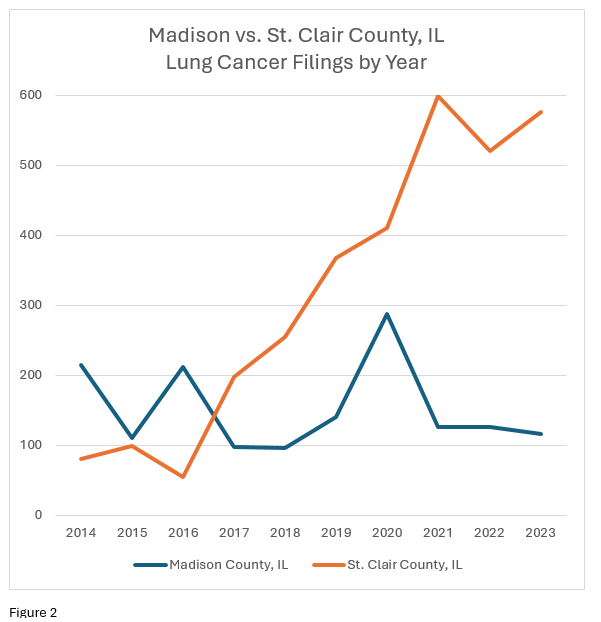
Last month, new updates to Madison County’s Standing Case Management Order for All Asbestos Personal Injury Cases (“Standing Order”) were issued to be effective in that Illinois jurisdiction starting in 2025. Some amendments were meant to increase “judicial economy,” such as automatically granting certain agreed-upon motions (i.e. plaintiff’s motions for voluntary dismissal) and requiring all parties to participate in electronic filing and service. Other changes were more significant — affecting the number of cases that can go to trial as well as the criteria required for certain cases to go to trial.
These latter changes fall into three sections of the order: Docketing Assignment and Trial Setting; Conditions Precedent to Obtain a Trial Setting; and Expedited Trial Settings. Below I provide some highlights from each section.
Docketing Assignment and Trial Setting
Currently, the number of cases that could be set as “first out” trial status is capped at 780 cases per year. With the new standing order, this cap will be removed, and the Court will now “use its discretion as needed to limit the maximum number of cases set for ‘first out’ trial status to fairly and efficiently manage the Court’s docket.”
Similarly, the number of cases that could be identified as priority cases for a jury week is currently capped at 19 cases, but the revised order removes this cap and the Court will “use its discretion as needed to determine whether the total number of cases identified as priority cases assigned to trial by a single Plaintiff firm in a given trial week exceeds what is reasonable depending upon the circumstances including, but not limited to, the total number of cases for which certificates of readiness of trial have been filed.” The revised order also removes the current limitation that only two plaintiff firms can have cases set on a trial docket.
Trial Settings: Conditions Precedent to Obtain a Trial Setting
The new standing order also includes changes to criteria for the conditions precedent to obtaining an order to set a case for trial. Perhaps the most notable update was the removal of the condition requiring the following:
(d) …a copy of a treating doctor’s diagnosing report or expert opinion upon which the plaintiff now relies for prosecution of the alleged asbestos related malignancy claim. If the diagnosis is of an alleged asbestos related non-mesothelioma malignancy, either the diagnosing report or expert opinion provided must indicate in substance the following:
Trial Settings: Expedited Trial Settings
Lastly, the updates to the standing order change the requirements for applying for an expedited trial setting. Currently, any plaintiff who is at least 70 years old or who has been diagnosed with a very limited life expectancy (including a mesothelioma diagnosis) qualifies for an expedited trial setting. In the revised standing order, the age requirement has been lowered and expanded to include any plaintiff or plaintiff’s surviving spouse or next of kin (if the plaintiff is deceased) who is at least 67 years old. Other criteria have also been expanded to include those cases where the plaintiff (or surviving spouse/next of kin, if deceased) “shows substantial physical or financial hardship or alternatively shows good cause that the interests of justice will be served by granting a preference in setting for trial….” The revisions also add a time component to the expedited trial setting, stating that trial should be set within one year for non-mesothelioma cases and six months for mesothelioma cases.
Potential Impact of the Changes
The changes to Madison County’s Standing Order could have a significant impact on asbestos litigation filing trends in that jurisdiction as well as in neighboring jurisdictions.
Generally, we may see an increase in the number of cases that have trial dates set, since the number of trials is no longer capped and some of the requirements for trial setting have been removed. We also may see trial dates being set sooner with new six-month time frames specified for mesothelioma expedited trial setting and one year for non-mesothelioma diagnoses. The pressure of an upcoming trial date can often lead to pressure to reach a settlement agreement before a trial begins (to avoid trial costs, a potential bad verdict, etc.). More cases getting trial dates (and getting trial dates sooner) will likely have an effect on settlement negotiations and values.
All factors mentioned above, as well as the elimination of the requirement for medical documentation from a doctor or expert relating the plaintiff’s malignancy to asbestos exposure, could greatly impact the number of cases filed in Madison County and the disease mix of those cases. Since Madison County has been an epicenter of mesothelioma filings in asbestos litigation, we’re interested to see if the disease mix of cases filed there will change when the standing order goes into effect next year. Figure 1 below shows the percentage of total Madison County lawsuits filed in 2014–2023 that were for mesothelioma versus non-mesothelioma diagnoses (based on data KCIC processed through 1/31/2024). On average, 86% of asbestos lawsuits filed there over the past 10 years have been on behalf of mesothelioma claimants.

While mesothelioma is still widely accepted as an asbestos-related malignancy, other malignancies (for instance, lung cancer) have many potential causes (smoking, other air pollutants, etc.). Since plaintiffs are no longer required to produce a medical opinion supporting that their malignancy is allegedly asbestos-related in order to receive a trial date in Madison County, we may see an increase in plaintiffs with non-mesothelioma diagnoses filing there.
This might also affect nearby jurisdictions, as well. For instance, St. Clair County, Ill., has been a hot spot for lung cancer filings since 2017 (the same year the existing standing order went into effect, which included the documentation requirement to link a non-mesothelioma diagnosis to alleged asbestos exposure).
Figure 2 below shows lung cancer lawsuits filed in 2014-2023 in Madison County versus St. Clair County (based on KCIC data processed through 1/31/2024). With the changes to the Madison County Standing Order, we may see a change in where lung cancer plaintiffs file their lawsuits, between St. Clair and Madison County.

Again, the revised Standing Order for Madison County goes into effect in 2025. KCIC will be monitoring if and how these changes actually affect filing trends in asbestos litigation throughout next year and we will report back.
Never miss a post. Get Risky Business tips and insights delivered right to your inbox.

Megan Burns combines her broad technical skills with an ability to lead client teams on a variety of projects. For example, she helps clients deploy KCIC’s Ligado Platform for claims management — helping manage their mass-tort data, especially in the asbestos personal injury arena.
Learn More About Megan